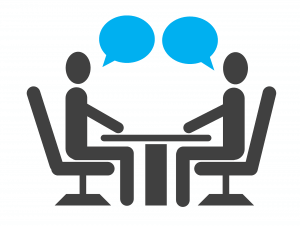
Your How to Guide for Acing Your Answers to Interview Questions
These days interviews aren’t the theoretical things that they used to be. The most challenging interview questions used to ask would be things like, ‘what would you do if…?’
That meant you could go and study a management textbook, regurgitate it back, and the person with the best memory could bag the role. Thankfully things have changed a lot, and it’s all about your experience. Wouldn’t it feel great to know you are ready to deal with any interview question eventuality? Well here we go…
If you haven’t done the Career Story (check out my Mapping your Career Story Blog Post here), do that now, it makes everything else so much easier!
Let’s Get Started!
For an interview at a senior level. You are going to need at least 5-7 great examples that you can draw on – that are applicable to multiple situations. This is why the map of your career story is important, because they should jump out at you. A great way to capture these is to mindmap them…see picture below. It’s a visual way of capturing the essence of the example so you can remember all the key components, in the right structure, and make it easily to visualise when you need to recall it. The process of creating them really helps you to think out your example too.

You’ll notice from my masterfully drawn example above (yes, I know I should be presenting an art programme on TV, but they’re worried I’ll make it look to difficult for viewers), that there’s a specific structure…
STARR (Traits)
I will take you through this now…
S – Situation
This is a brief explanation of the situation that lead you to take on the project, or the context that necessitated the course of action that followed.
T – Task
Given the situation, what was the outcome that was being looked for, the scope of the task.
A – Action
The actions you took to complete the project or resolve the issue. This is all the key steps of the process you used, and this is what they’re really looking for. Here you need to demonstrate that you know how to deal with the challenges that they are facing.
R – Result
This is your next big measure of credibility. How well did you achieve what you set out to. You’re going to want to demonstrate that you got the outcomes that you described as part of the Task, and where possible, with facts and figures to back it up. You may also want to throw in some of the secondary gains. So for example, in my mindmap example, a key outcome was to bring the project back into within the deadline. A secondary gain because of my approach may be that I increased employee engagement in the related teams by 15%.
R – Reflection
You may have heard of the STAR model, this is my addition, which looks at what did you learn? And what would you do differently the next time? Here you are demonstrating your capacity to grow, to be analytical, to be reflective, and to improve in everything you do.
The TRAITS part helps you identify what traits (in line with the job description and requirements) are demonstrated within the example, so that when interview questions comes up on leadership and communication (or whatever it is), you know which is your best example for it. It also helps you to think out the example in a recruiter-like way. Examine what is it they are looking for, and how do my examples deliver that?
How this works in Practise
Whether you are asked experience based interview questions or not, it’s always best to answer with an example. For arguments sake, they may ask…
What leadership skills would you need to bring a multi-million pound project back on deadline?
The Answer in Practise
Your answer would then go…
To bring the project back to the deadline **, you would need to consider…resourcing, the current plan, what are the issues that have caused the plan to drift, team relationships (and so on). I have experienced a similar situation with…[bring in your example], and here’s how I approached it..
The Situation was…
The Task therefore needed to be…
The Actions I took were…
The Results I got were…
And on Reflection, I learned…
So if I were to be faced with a similar situation, here’s what I would do differently…
You are demonstrating that you know what to do AND that you’ve already done it, bought the T-shirt, and kicked ass whilst wearing it!
** Repeating interview questions back at the beginning of your answer helps your brain remember and focus on the question so you’re less likely to wander off course.
The Importance of Your Language
As well as taking care over the structure of your answer, the language you use is extremely important. During coaching, I would not only drill you on your structure, but be listening out for any language you use that may weaken your case and credibility.
In my post on Marginal Gains (go read it!), I cover how to use the language that will give you the advantage of sounding like you fit in with the culture of the organisation you want to work with. Here’s a few more language tips to be aware of so that you deliver your answers in as confident and credible way as possible.
- It’s always I not we. Us women can have a bit of an issue blowing our own trumpet and being the big ‘I am’. There is no place for false modesty in an interview!
- Make your language positive:
- Instead of problem – use challenge
- Don’t call a person difficult – you appreciate the diversity different personalities have to offer and enjoy working out how to get the best from them
- Instead of weakness – you may refer to it as an opportunity for learning and growth
- Never slate any company or person you have worked for
- Beware the uhhh’s, and uhm’s. Instead you can take a breath and a pause. You don’t need to fill the space, in fact, pauses give a sense of confidence and intelligence.
- Never end your sentence with a question – such as ’isn’t it?’, or a qualifier ‘at least in my opinion’. It damages your credibility.
- Beware of minimising language:
- Just…
- Suppose…
- Feel like I’m good at…
- Might…
- And the worst type…I’m no expert, but…
- Sort of/ kind of…
Just NOOOOOOOOOOOOOOO! Enough of that. You have to own it:
- I’m good. Great, amazing at…
- I know I can do this because… (Insert your example here)
- I have demonstrated repeatedly how …
- Drop the sort of and just state it. In fact there’s a lot to be said for dropping language fillers generally.
Always be honest, own any weaknesses and turn them around…how have you managed them? How have you turned them around? How do you make sure they never get tin the way of you doing a great job? It important to realise that interviewers are not looking for a robot. They want to know you are the real deal.
In addition, always recommend people practise answering interview questions out loud. Talk to the dog, your baby, a plant. Practise in the car (easy now it looks like you’re talking on the phone). Wherever you are practise. For the older readers, you may remember a scene from the film The Commitments, where Jimmy Rabbitte is in the bath pretending to be interviewed by Terry Wogan. That’s what I want you to do!
Why Should I Talk to Myself???
When you hear yourself out loud you can catch all sorts of issues and correct them as you go (it might even be worth recording yourself). It helps you hear how you’ll sound. It also helps you get into the rhythm of answering interview questions. There’s definitely a rhythm to it that isn’t natural, but by practising out loud you can make it feel and come across that way.
What will they ask you?
Here’s a great article on the basics:
https://biginterview.com/blog/interview-questions-answers
Finally, go back to the exercise you did in the marginal gains blog and devise interview questions around every single requirement they are looking for. They are likely to ask:
- Tell me about a time when you demonstrated…
- When have you had difficulties achieving …
- What was the most challenging example of…
- Give an example of a time when…
- What have you done to ensure…
So there you have it, a few things to take your answers from the average to the excellent. Above all, interviewers make decisions based on how they feel about you. Help them feel great about you! Coming up in this series will be techniques to manage your nerves, build rapport, master your body language, and have amazing impact!
To ensure you don’t miss any of my golden tips (and I really know how to kill it in all of these areas), why not come and join my amazing community of Career Winners. All ambitious women looking to excel so they can glide up the career ladder.
If you want to see how I can put you through your paces and make absolutely sure the job is in the bag, why not book in for a FREE discovery call with me.
Until next time,
Let your light shine xx






